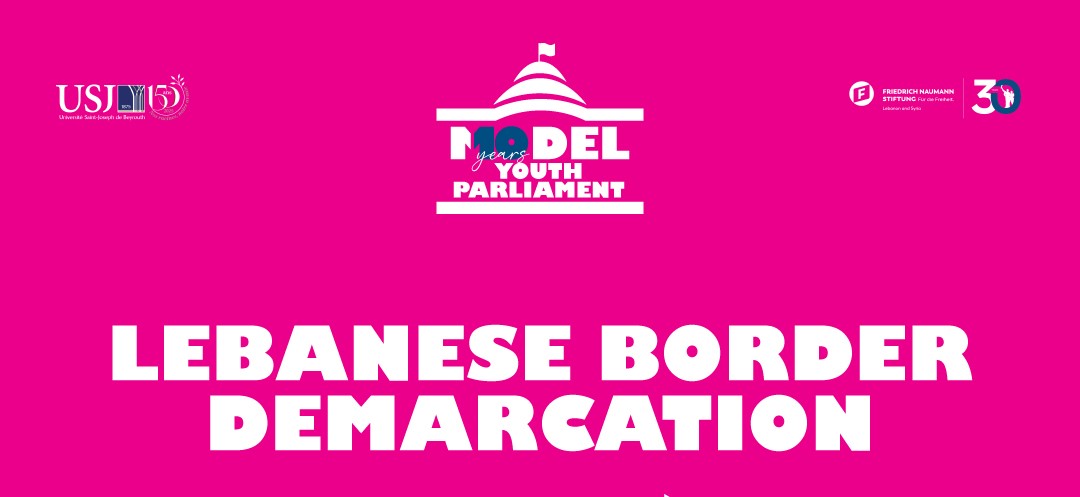Model Youth Parliament
Drawing the Line

Written by MYP10 mentors Adnan Haddad and Joseph Sfeir
During MYP10, as youth delegates debate laws to shape Lebanon’s future, one proposal stands out: a law to formally demarcate Lebanon’s land borders. For over a century, Lebanon has functioned without clear internationally recognized boundaries with Syria and Israel. This legal ambiguity continues to undermine national sovereignty, development, and diplomacy. The draft law proposes establishing a National Authority for Land Border Demarcation, which is a permanent institution to define, defend, and document Lebanon’s land borders with legal clarity and international credibility.
What is the Problem?
Lebanon’s border challenges are historical and persistent. In the south, Israel occupies Shebaa Farms, Kfar Shouba Hills, and the northern part of Ghajar, despite Lebanon’s internationally recognized boundaries from the Paulet–Newcombe Agreement (1923). Although the UN established the Blue Line in 2000 as a withdrawal line, Lebanon officially disputes 13 of its points. Daily air and land violations by Israeli forces continue, violating Lebanon’s sovereignty and Resolution 425, which called for full Israeli withdrawal from southern Lebanon.
In the east and north, over 365 kilometers of border with Syria remain poorly defined. More than 25 locations, including Deir El Ashaer and Qaa–Jousieh, face land disputes and legal confusion. Some Lebanese properties are listed in Syrian records, and residents suffer from restricted access, administrative voids, and security risks. The absence of an official demarcation has enabled smuggling networks, illegal crossings, and weakened state authority.
The Case of the Seven Villages
Additionally, the historical issue of the Seven Villages (Tarbikha, Saliha, Malkiyeh, Nabi Yusha, Qadas, Hunin, and Ibl al-Qamhadds) depth to Lebanon’s border narrative. Originally Lebanese, these villages were annexed to Palestine under colonial rule and now lie within Israeli territory. Though not part of current demarcation efforts, Lebanon continues to assert their historical Lebanese identity based on legal records.
UN Resolutions 242 & 425
Two key UN resolutions frame Lebanon’s legal position: Resolution 242 (1967), which calls for Israeli withdrawal from occupied territories and emphasizes secure and recognized borders for all states, and Resolution 425 (1978), which specifically called for Israel’s withdrawal from Lebanon. Despite Israel’s 2000 pullout, the continued occupation of Lebanese territory directly contradicts these resolutions.
Why This Draft Law?
To address these gaps, the draft law proposes the creation of a strong and lasting National Authority for Land Border Demarcation. This body would be multidisciplinary, institutional, and independent. It would collect historic documents, legal treaties, maps, and official records; coordinate with international actors like the UN and the EU; and engage in diplomatic negotiations to finalize and internationally certify Lebanon’s borders. It would also serve as a centralized legal and technical reference for government actions, national defense, and foreign policies.
Unlike short-lived committees of the past, this authority would have permanence and legal weight. It ensures consistency, prevents duplication, and builds a memory archive critical for border diplomacy. Its work would cover all disputed regions and provide Lebanon with the evidence and capacity needed to defend its borders in international courts.
Lessons from Other Countries
Countries facing similar challenges have implemented successful models. Nigeria established a commission after an ICJ ruling on the Bakassi Peninsula; Tunisia created a border authority to secure its desert borders and enhance development; Georgia formed a specialized agency to manage disputes with Russia. These examples show how structured institutions can restore sovereignty, improve security, and empower marginalized border communities.
What is at Stake?
Passing this law would bring multiple benefits. First, it would enhance national security by restoring state presence in sensitive areas. Second, it would allow economic development in regions long neglected due to legal confusion. Third, it would strengthen Lebanon’s stance in maritime disputes such as those involving Line 29 and the Karish gas field by grounding maritime claims in clearly defined land borders.
The Inaction Costing
The cost of delay is equally clear. Without demarcation, Lebanon remains vulnerable to border violations, diplomatic manipulation, and economic loss. Unregulated borders fuel smuggling, weaken governance, and marginalize thousands living near the frontier. Lebanon’s failure to act also diminishes its credibility in global diplomacy and weakens enforcement of international resolutions.
A Constitutional Duty
This law is more of a constitutional duty than a policy. Article 1 of the Lebanese Constitution affirms the unity and territorial integrity of Lebanon within internationally recognized borders. The law aligns with this duty, transforming Lebanon’s moral claims into legal and documented facts that can be defended.
Borders Define Identity
Demarcating borders affirms Lebanon’s right to control its land, and protect its people. The creation of a National Authority for Border Demarcation will help Lebanon reclaim sovereignty where it matters most: on the ground, on maps, and in laws.